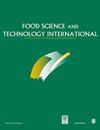超声波处理和微过滤处理对大王椰子(Cocos nucifera var.
IF 1.8
4区 农林科学
Q3 CHEMISTRY, APPLIED
引用次数: 0
摘要
本研究旨在探讨热加工和非热加工对大王椰子水的物理化学、微生物和感官特性的影响。除新鲜样品(对照组)外,对椰子王水样品进行了超声波处理(50 kHz,35 ℃下 30 分钟)、微滤(0.5 µm)和焦亚硫酸钠(0.1 g/L)热处理(90 ℃下 10 分钟)。对样品进行了理化、微生物和感官参数测试。所有处理过的样品的 pH 值、可滴定酸度和总糖在 28 天的贮藏期间均符合斯里兰卡标准(SLS)(分别为 4.6-5.5、0.07-0.1%、4.1-6.5%)。添加焦亚硫酸钠可显著降低褐变指数。贮藏 4 周期间,微过滤和超声波处理样品的抗氧化剂和酚含量分别在 49%-65% 和 2.5-2.8 GAE mg/100 mL 之间,与热处理样品相比明显较高。热处理样品的感官评价属性值最低。微生物分析表明,经微过滤和超声波处理的椰子王水在 4 周内仍可安全饮用。超声波和微过滤以及焦亚硫酸钠被认为是加工大王椰子水并保持其健康特性的有效方法。本文章由计算机程序翻译,如有差异,请以英文原文为准。
An investigation on the effect of ultrasonication and microfiltration processing on the quality of king coconut (Cocos nucifera var. aurantiaca) water compared to minimal and thermal processing
The study aimed to investigate the effect of thermal and non-thermal processing on the physicochemical, microbial, and sensory characteristics of king coconut water. King coconut water samples were subjected to ultrasonication (50 kHz, 30 min at 35 °C), microfiltration (0.5 µm), and thermal treatments (at 90 °C for 10 min) with sodium metabisulfite (0.1 g/L) except the fresh sample (control). Samples were tested for physiochemical, microbial, and sensory parameters. Storage studies were conducted at 4 °C for 28 days. pH, titratable acidity, and total sugar of all treated samples were within the Sri Lankan Standard (SLS) limit (4.6–5.5, 0.07–0.1%, 4.1–6.5%, respectively) during the 28 days of storage. Sodium metabisulfite addition was significant in lowering the browning index. Antioxidant and phenolic contents of microfiltered and ultrasonicated samples varied between 49%–65% and 2.5−2.8 GAE mg/100 mL, respectively, during 4 weeks of storage, which was significantly higher compared to the heat-treated samples. Sensory evaluation scored the lowest attribute values for thermally treated samples. Microbial analyses indicated that microfiltered and ultrasonicated king coconut water remained safe for consumption for up to 4 weeks. Ultrasound and microfiltration, with the integration of sodium metabisulfite, were identified as effective methods for processing king coconut water while preserving its wholesome properties.
求助全文
通过发布文献求助,成功后即可免费获取论文全文。
去求助
来源期刊
CiteScore
5.80
自引率
4.30%
发文量
63
审稿时长
18-36 weeks
期刊介绍:
Food Science and Technology International (FSTI) shares knowledge from leading researchers of food science and technology. Covers food processing and engineering, food safety and preservation, food biotechnology, and physical, chemical and sensory properties of foods. This journal is a member of the Committee on Publication Ethics (COPE).

 求助内容:
求助内容: 应助结果提醒方式:
应助结果提醒方式:


